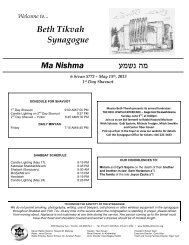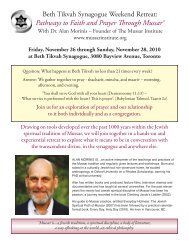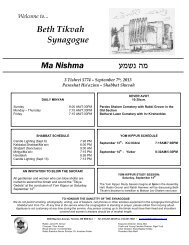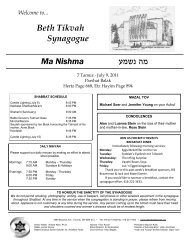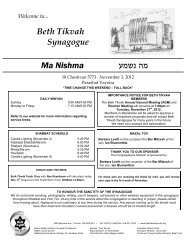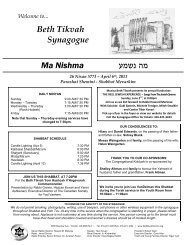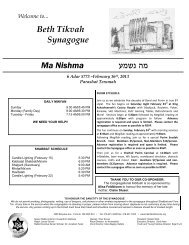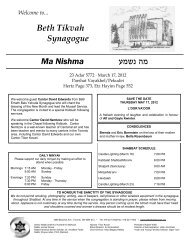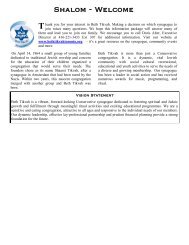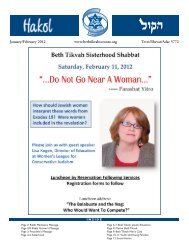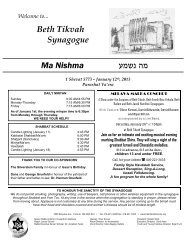Hakol FEB-MARCH 2011 rfs.pdf - Bethtikvahtoronto.org
Hakol FEB-MARCH 2011 rfs.pdf - Bethtikvahtoronto.org
Hakol FEB-MARCH 2011 rfs.pdf - Bethtikvahtoronto.org
Create successful ePaper yourself
Turn your PDF publications into a flip-book with our unique Google optimized e-Paper software.
RABBI<br />
JARROD GROVER<br />
The Chain of Jewish<br />
Tradition<br />
Most scholars tell us that the first<br />
edition of the Mishnah, the Jewish<br />
legal code upon which the Talmud<br />
is based, could not have been edited later<br />
than the year 218 CE. Scholars were able<br />
to determine this date because we know<br />
that in the same year a rabbi named Abba<br />
bar Ayvo (aka Rav) left Rabbi Judah’s academy<br />
at Sepphoris with the Mishnah in<br />
hand.<br />
Rav was originally from Babylonia and<br />
came to Sepphoris to study with Rabbi<br />
Judah. In time, he became one of Rabbi<br />
Judah’s chief disciples, the latter ordaining<br />
him a rabbi. But Rav did not stay in<br />
Sepphoris forever. He returned to his native<br />
country and established in Sura one of the<br />
great Babylonian academies.<br />
I would like to think that Rabbi Judah<br />
made a special effort to complete the<br />
Mishnah before Rav left to return home to<br />
Babylonia. While we lack evidence, it’s<br />
plausible to imagine that Rabbi Judah foresaw<br />
that his disciple desired eventually to<br />
return home to Babylonia. Therefore,<br />
Rabbi Judah, the responsible teacher,<br />
worked to ensure the Mishnah’s completion<br />
so that Rav would be well-equipped.<br />
Thus, another link is added to the chain of<br />
Jewish tradition. A rabbi is only as effective<br />
as his ability to pass on his knowledge.<br />
Rabbi Judah was fully conscious of this,<br />
and Rav was the beneficiary.<br />
In the same way, I feel privileged to have<br />
inherited much wisdom from my predecessor.<br />
And we should all feel the same way.<br />
Rav based his Talmudic commentary on<br />
the foundation laid by Rabbi Judah, and<br />
we similarly are able to build Beth Tikvah<br />
on the solid foundations laid by Rabbi<br />
Allen and those that came before him.<br />
I join with the congregation in wishing<br />
Rabbi Allen success in his future endeavours.<br />
Not only are we grateful for his many contributions,<br />
but we thank him for ensuring<br />
that we’re prepared to continue our tradition<br />
of excellence.<br />
Thoughts, Mitzvot, and Times for Purim at Beth Tikvah<br />
Adapted by Rabbi Grover<br />
“There is one nation scattered and separated among<br />
the nations whose customs and actions are different,<br />
and they are not worthy of your tolerance.”<br />
–Megillat Esther 3:8<br />
Haman tries to convince Ahashverosh, the<br />
King of Persia, that this different nation<br />
should not be tolerated. Haman succeeds in<br />
winning over the heart of the king and were<br />
it not for the change of events, his plan<br />
would have been actualized. Our sages<br />
teach us that within each of us there resides<br />
an aspect of Haman, of evil, which whispers<br />
to us that the one who is different should<br />
not be tolerated. The mitzvot of Purim are<br />
aimed at deconstructing these perceived differences<br />
and silencing that whisper.<br />
Both men and women are obligated to<br />
observe four unique Mitzvot on Purim.<br />
Megillah - Hearing the reading of the<br />
Megillah enables us to re-live the story<br />
recounting its messages. One is obligated to<br />
hear the Megillah twice; once at night and<br />
once during the day. One must hear every<br />
word of the Megillah read from a “kosher”<br />
parchment. Here at Beth Tikvah we will<br />
read the Megillah: Saturday night, March<br />
19th at 7:05 p.m. (Megillah reading at<br />
8:15 p.m.) and Purim day, Sunday morning<br />
March 20th at 8:30 a.m. (Megillah reading<br />
begins at 9:30 a.m.).<br />
Matanot L’Evyonim - Gifts to the poor,<br />
reminds us that our possessions are in truth<br />
not fully ours. One has a responsibility to<br />
find two poor people and provide each, at<br />
the minimum, enough money for a meal.<br />
In addition to this halakhah, on Purim one<br />
should give to anyone who asks for a donation.<br />
The total giving should ideally be<br />
equivalent to or surpass the amount that one<br />
spends on his/her own Purim Meal. Money<br />
collected by Beth Tikvah this year will be<br />
distributed to the Carmel Fire Crisis Relief<br />
Fund.<br />
Mishloah Manot – Gifts of food to one<br />
another, allows us to reach out to share our<br />
celebration of the day, and to increase love<br />
and friendship with others in the community.<br />
There is a custom to send Mishloah<br />
Manot to those who one has had particularly<br />
strained relations with over the past year.<br />
One is obligated to send two kinds of ready<br />
to eat foods to a fellow Jew to enhance their<br />
Purim meal. We do not send Mishloah<br />
Manot to those who are in mourning.<br />
Seudat Purim - Celebratory Purim Meal.<br />
From a minimalist perspective, one is obligated<br />
to have a meal with bread; however ideally<br />
the meal should be a joyous festive meal,<br />
with meat (for those who eat it), and wine in<br />
an effort to help us blur distinctions that we<br />
often hold fast to. When one drinks wine<br />
he/she easily learns that what distinguishes<br />
him/her from a babbling fool is often only a<br />
few ounces of chemical. This year we will<br />
have a communal seudah with dancing on<br />
Purim Day, March 20th. The program<br />
begins at 6:00 p.m. with meal taking place<br />
before sunset. Minhah and Ma’ariv services<br />
will follow the meal at 7:30 p.m.<br />
With the exception of Megillah, which is<br />
read also at night, all of the mitzvot should<br />
only be performed during the day of Purim.<br />
Note: In the Birkat Hamazon as well as in<br />
the Shemoneh Esrei one should include the<br />
Al Hanisim insertion for Purim; if f<strong>org</strong>otten<br />
one does not repeat the prayer. Please also<br />
note that preparations for Purim may not<br />
occur on Shabbat. Members may store their<br />
costumes in the synagogue before Shabbat.<br />
In addition, the Fast of Esther begins<br />
Thursday morning March 17th at 6:14 a.m.<br />
and ends at 7:46 p.m. The only restriction<br />
of the fast is eating and drinking. One may<br />
bathe, shave and enjoy live entertainment as<br />
usual. However, as with all fasts, it should<br />
be used as an opportunity for introspection<br />
and personal growth. Our sages have taught<br />
that only one who experiences the Fast of<br />
Esther can truly celebrate on Purim.<br />
Page 2 <strong>Hakol</strong> - Feb/Mar <strong>2011</strong>



